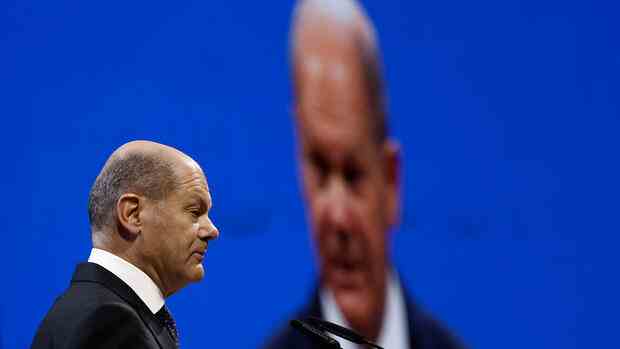Berlin Federal Chancellor Olaf Scholz (SPD) will receive the automotive industry for the first time on January 10th for a top-level discussion in the Chancellery to discuss the future of Germany’s key industry. The Handelsblatt learned this from government circles.
According to information from the Handelsblatt, the CEOs of the major car manufacturers BMW, Daimler and Volkswagen as well as an automotive supplier have been invited this time. Federal Economics Minister Robert Habeck (Greens) and Transport Minister Volker Wissing (FDP) will also take part, along with the chairmen of their advisory groups.
Professors Monika Schnitzer, Chair of the Advisory Council and economic researcher at the University of Munich, and Ina Schaefer, vehicle computer scientist at the Karlsruhe Institute of Technology, head the expert group “Transformation of the Automotive Industry” (ETA) set up in the summer of 2022 at the Ministry of Economic Affairs. Professor Meike Jipp from the German Aerospace Institute and Franz Loogen, head of E-mobil BW, a government advisory organization in the Autoland Baden-Württemberg, head the Expert Advisory Board on Climate Protection in Mobility (EKM) in the transport department.
Top jobs of the day
Find the best jobs now and
be notified by email.
Three organizations that are represented in both advisory groups have also been invited: IG Metall, the Association of the Automotive Industry and Agora Verkehrswende.
Ministers are arguing about the right path to climate-friendly mobility
The ETA chairmen want to present initial recommendations for action on the topics of “secure raw material supply” and “digitization”. There is an intensive discussion on this in Germany and at European level, for example on the question of who owns the data generated in the vehicle and who may use it and in what form. There are also great hopes for networked driving, in which vehicles communicate with each other and, for example, traffic flows optimally.
The value chains and the supply of raw materials have come under increasing scrutiny in view of the Russian war of aggression against Ukraine and China’s geopolitical behavior. There were considerable bottlenecks last year and correspondingly long delivery times for new vehicles.
>> Also read here: Interview with Ulrike Malmendier: “The supply chains will collapse again”
However, another item on the agenda is likely to cause discussions: “Climate and environmental protection”. Ministers Habeck and Wissing have been arguing for months about how the transport sector can meet its climate targets. While the climate minister is calling for concrete measures, the transport minister is relying on incentives that people should use to change their behavior and switch to climate-neutral mobility.
However, motorists consumed a good four percent more petrol in 2022 than in 2021 – despite higher fuel prices, as the AG Energy Balance determined. The Agora Energiewende also determined in a report that the transport sector missed its climate targets for the second time in a row in 2022. “In traffic, CO2 emissions of 150 million tons of CO2 were well above the permitted value of 139 million tons of CO2,” the think tank sums up. In 2021, the transport sector had emitted three million tons too much.
Wissing, on the other hand, demands that Habeck keep nuclear power plants running. This is the only way electric cars can be supplied with sufficient CO2-free electricity in the future so that they can really drive in a climate-neutral manner, he argues.
The electric car is no longer sacrosanct
This debate about climate goals and the transformation of the automotive industry should also be fueled by one of the car bosses: the new Volkswagen boss Oliver Blume. In contrast to his predecessor Herbert Diess, he not only relies on electrically powered vehicles, but also continues to uphold combustion engines. Combustion engines are “very popular in many regions of the world,” he recently explained in the magazine “Auto Motor & Sport”.
Blume, who is also the head of Porsche, propagates synthetic fuels, so-called e-fuels. “Gasoline engines can be operated with them with almost no CO2 emissions. In this way, all vehicles can do their part to reduce CO2 – regardless of the type of drive,” he advertises.
>> Also read here: Car manufacturers are working on small electric cars – but that will take years
Existing vehicles would also benefit from this. According to the VW boss, e-fuels “as a hydrogen derivative can be excellently mixed with fossil fuels”. Every percent added is a contribution to climate protection.
The FDP and Transport Minister Wissing has Blume on his side. The Greens, on the other hand, reject his proposal and defend the European decision to only allow CO2-neutral vehicles from 2035. Before that, the emission standards are to be tightened again. This criticizes the car industry as well as the government’s decision to end the purchase subsidies for electric cars. From the point of view of the industry, the expansion of the charging station infrastructure is also progressing too slowly.
According to information from the Handelsblatt, there will be a top-level discussion with the Federal Chancellor twice a year in the future. For example, Eta should present recommendations for future employment in the industry and evaluate how successful the 25 so-called transformation networks financed with the future fund are.
With these transformation networks, municipalities, districts and chambers of industry and commerce, together with the Federal Employment Agency, are trying to retrain and further qualify employees so that as few people as possible become unemployed in the transition.
Another group deals with the ecological footprint of the automotive industry. So the focus should not only be on “what comes out of the exhaust at the back, but on the entire production”, as it was said in government circles.
More: Transport Minister Wissing wants to transport more goods by ship – but without a major reform
